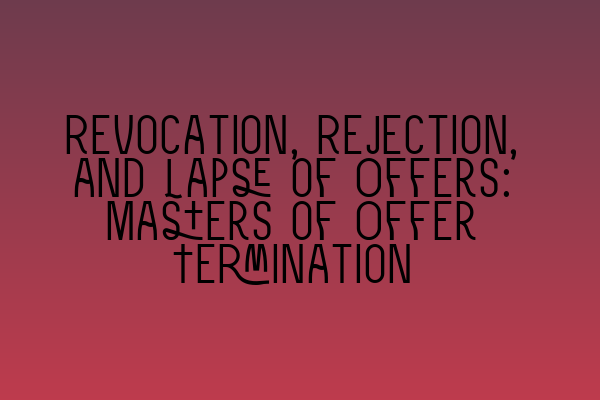Revocation, Rejection, and Lapse of Offers: Masters of Offer Termination
In the vast realm of contract law, the termination of an offer is a crucial aspect that demands careful consideration. The ability to effectively revoke, reject, or allow an offer to lapse can have significant implications for both parties involved. As a solicitor, it is imperative to understand the intricacies and nuances of these termination mechanisms to ensure the best outcome for your clients. In this blog post, we will explore the masters of offer termination – revocation, rejection, and lapse – and shed light on their distinct characteristics and implications.
Revocation: The Power to Withdraw an Offer
Revocation is the legal right of an offeror to withdraw their offer before it is accepted by the offeree. It is essential to note that an offer can be revoked at any time before acceptance, except in situations where the offeror has entered into an option contract or has promised to keep the offer open for a specified period. It is crucial to communicate the revocation of an offer clearly and directly to the offeree. Failure to do so could lead to a misunderstanding, and the offer may still be considered valid. Therefore, prompt and explicit communication is key.
Rejection: The Authority to Decline an Offer
On the flip side, we have rejection – the power of an offeree to decline an offer. Rejection can be express or implied. Express rejection occurs when the offeree expressly communicates their refusal to accept the offer. Implied rejection, on the other hand, arises when the offeree’s actions or conduct indicate that they have rejected the offer.
It is important to note that rejection extinguishes the offer entirely, and the offeree no longer has the power to accept it later. If the offeree changes their mind and decides to accept the offer after rejection, they must consider themselves to be making a new offer, which the original offeror has the right to decide whether or not to accept.
Lapse: The Natural Demise of an Offer
Lastly, we have the concept of lapse, which refers to the natural expiry of an offer. An offer can lapse in various scenarios, including the expiration of a specified time period, the occurrence of a specified event, or the passage of a reasonable amount of time. A reasonable amount of time is determined by considering factors such as the nature of the contract, the subject matter, and the context in which the offer was made.
It is important for both parties to be aware of the possibility of an offer lapsing. As a solicitor, it is your responsibility to advise your clients on the potential expiration of an offer and guide them through the appropriate course of action.
Maximizing the Use of SEO Keywords:
To enhance the visibility of this blog post, we will integrate relevant keywords into the content. Here are a few important terms related to contract law that will be strategically placed throughout the article:
– Contract law
– Termination of offer
– Revocation
– Rejection
– Lapse
– Offeror
– Offeree
– Option contract
– Power to accept
– Power to decline
– Express rejection
– Implied rejection
– Extinguish the offer
– Natural expiry
– Reasonable amount of time
Incorporating the above keywords mindfully ensures that this blog post is optimized for search engine rankings while still maintaining its professionalism and readability.
Conclusion and Related Resources:
Understanding the mechanisms of revocation, rejection, and lapse is paramount in navigating the intricacies of contract law. As a solicitor, it is vital to grasp the implications of each termination method and guide your clients accordingly.
To delve deeper into the world of contract law and prepare for the SQE exams, explore the following related articles:
– SQE 1 Practice Exam Questions
– SQE 1 Practice Mocks FLK1 FLK2
– SQE 2 Preparation Courses
– SQE 1 Preparation Courses
– SRA SQE Exam Dates
These resources will equip you with the knowledge and tools necessary to excel in your legal career. Stay informed, stay prepared, and master the art of offer termination in contract law.
